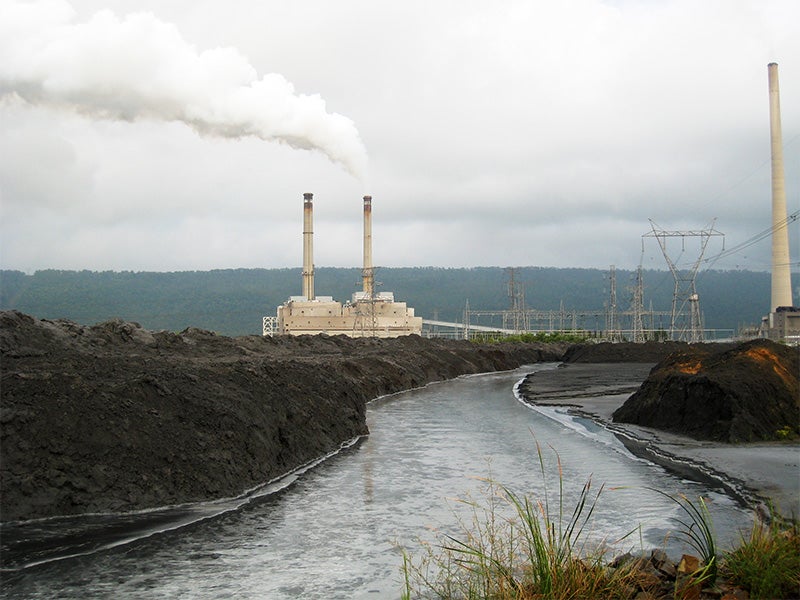Court Expands Public’s Right to Know of Power Plant Water Pollution
Groups seek internal government documents detailing back-room dealings on power plant water pollution
Contact
Environmental groups are filing a complaint against the White House Office of Management and Budget (OMB) to compel the agency to release additional information about the roles OMB played in weakening the Environmental Protection Agency’s proposed rules to satisfy the concerns of power companies. The complaint is being filed in the wake of a recent order by a federal judge expanding a Freedom of Information Act lawsuit against the U.S. Small Business Administration (SBA) involving OMB and SBA efforts to weaken proposed environmental regulations of power plant water pollution.
“The Obama administration worked behind the scenes to weaken the EPA’s proposal, and now they are trying to cover their tracks,” said Earthjustice attorney Thomas Cmar. “The public has a right to know about the political pressure that forced the EPA to rewrite its proposal to allow for much dirtier waterways and put our health at risk.”
The complaint and order paves the way for environmental groups to challenge OMB’s failure to provide a complete response to their FOIA request for documents showing OMB’s role in weakening EPA’s proposed rule. OMB has released over 800 pages of correspondence concerning EPA’s proposed rule but blacked out the vast majority of that material on the ground that it was exempt from public disclosure.
“EPA sent over a strong rule to the White House that would get arsenic and other toxics out of our water using affordable treatment technologies. But the White House over-ruled EPA scientists and re-wrote the rule to include options that would give coal plants a free pass to continue using our waterways as their own private waste dumps. Now the White House is refusing to comply with FOIA and release information related to their review of EPA’s rule or justify why it should be withheld from the public,” said Jennifer Duggan, Managing Attorney for the Environmental Integrity Project. “After more than thirty years of delay in setting limits to curb pollution from power plants, the public has a right to know why this Administration is standing in the way of commonsense safeguards that protect downstream communities and our watersheds from dangerous heavy metals.”
In 2010, environmental groups filed a lawsuit against EPA to compel it to update the standards based on affordable, state-of-the-art technologies that have the potential to virtually eliminate toxic pollution of our waterways from coal-fired power plants. The EPA proposed the new rules in April 2013, but only after the White House review of the proposed rules forced the agency to significantly weaken their requirements.
“Coal ash is the number one source of toxic water pollution in the United States, yet there are no uniform limits on how much power companies can dump into our rivers and lakes,” said Waterkeeper Alliance attorney Peter Harrison. “EPA finally proposed limits for this industry last year, only to have the rule crippled by White House bureaucrats with no scientific expertise. The White House has rigged the game, and then tried to bury the records that would show us how they did it. The public has a right to know the whole story.”
Earthjustice, Environmental Integrity Project, and the Sierra Club first filed a lawsuit in December 2013 based on SBA’s failure to provide a complete response to FOIA requests about the behind-the-scenes role it played in influencing the EPA’s proposed power plant water pollution rule. In January, the groups sought to expand their lawsuit to include challenges to related FOIA responses from the White House and EPA; the agencies opposed the request. In Monday’s order, the U.S. District Court for the District of Columbia ruled that the groups could proceed against SBA and OMB in one lawsuit but would have to file a separate lawsuit to seek additional information from EPA.
“American’s have waited far too long for the Obama administration to protect our communities from toxic coal ash pollution,” said Jennifer Peters, National Water Campaigns Coordinator for Clean Water Action. “Dirty coal plants are dumping billions of pounds of toxic chemicals into our water every year and the health of our drinking water is at risk. It’s time for the Obama administration to stop dragging its feet, stop compromising for industry, and finalize a strong rule to protect our water and communities.”
Despite Clean Water Act requirements, the EPA has not revised its rules limiting power plant water pollution since 1982. Coal-fired power plants are the largest discharger of toxic pollution in the U.S., dumping over 5 billion pounds of mercury, arsenic, lead and selenium into our waters each year.

Additional Resources
About Earthjustice
Earthjustice is the premier nonprofit environmental law organization. We wield the power of law and the strength of partnership to protect people's health, to preserve magnificent places and wildlife, to advance clean energy, and to combat climate change. We are here because the earth needs a good lawyer.